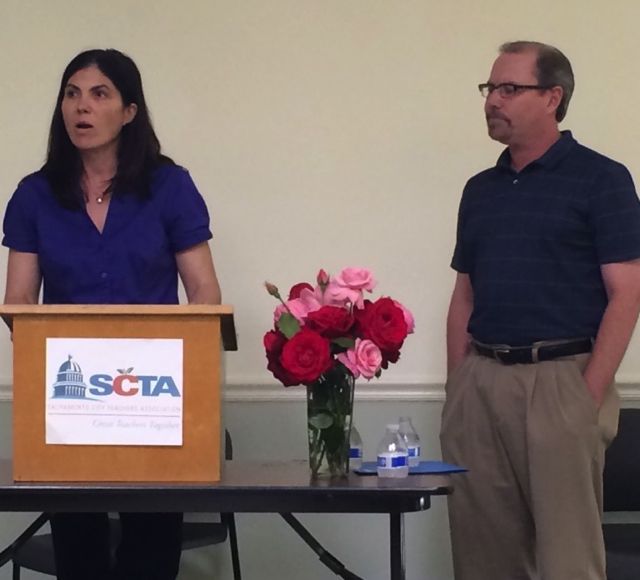Faced with intense opposition from teachers, Sacramento City Unified announced Wednesday it would not join other California districts in reapplying for a waiver from the federal No Child Left Behind law.

Nikki Milevsky, president of the Sacramento City Teachers Association, left, and school board president Patrick Kennedy announce the district’s intent not to pursue a No Child Left Behind waiver. Credit: Sacramento City Teachers Association
Its defection leaves seven of eight districts seeking to extend a waiver from the federal accountability law through the California Office to Reform Education, a nonprofit that they formed. The waiver they got last year was the first for school districts, as opposed to a state department of education. The CORE districts applied because California was one of only four states that either didn’t seek a waiver or had its request rejected.
Rick Miller, executive director of CORE, said Wednesday he expects the other CORE districts to seek and receive a one-year extension of the waiver. They include three of the four largest unified districts in the state: Los Angeles, Long Beach and Fresno, plus San Francisco Unified, Oakland Unified, Santa Ana Unified and Sanger Unified.
From the start, former Sacramento City Superintendent Jonathan Raymond’s pursuit of the waiver alienated the district’s teachers union, which accused him of acting on his own instead of collaborating. The anger hasn’t abated since Raymond left in December.
“What started as a backlash against Jonathan Raymond took on a life of its own,” said school board President Patrick Kennedy. “We just came to the point of total paralysis,” where a stalemate over terms of the waiver were interfering with other negotiations and work in the district, he said.
“I would love to have continued with the waiver,” said interim Superintendent Sara Noguchi. “But we were at a complete halt.”
Nikki Milevsky, president of the teachers union, said in a statement at a press conference with Kennedy, “We applaud the district’s decision not to seek a renewal of the waiver and look forward to working with them without this divisive topic hanging over all our conversations.… Our hope is that in moving forward with the waiver behind us we can tackle many of the initiatives important to both the district and teachers.”
The CORE districts’ superintendents didn’t need the consent of their unions to apply for the waiver, although some of the commitments they made to the federal Department of Education, such as using test scores in teacher evaluations, eventually will need to be negotiated to retain a waiver. Raymond said that he consulted with union leaders before applying; union leaders deny that.
The waiver has definite advantages, which Milevsky acknowledged. For one, districts have flexibility with a portion of their federal Title I dollars that had to be spent on outside tutoring services and transportation for students who enrolled in a better-performing school. Sacramento City Unified had used the freed up $4 million to purchase classroom technology, to enable teachers to do tutoring and for online support for students. That money will now revert to outside tutoring firms.
In addition, districts no longer had to classify schools that failed to meet increasingly difficult academic targets as failures, with annual letters home to parents permitting them to change schools.
But to obtain a waiver, states and the CORE districts had to commit to identifying and transforming the lowest-performing schools, implementing the Common Core State Standards and incorporating standardized test scores in teacher evaluations. The waiver allowed districts latitude to determine how test scores would be used and how much weight they’d carry. But Sacramento teachers remain opposed to incorporating any standardized test scores in teacher evaluations, and Noguchi said there had not been discussions on possible ways to meet the waiver requirements.
The teachers unions in most CORE districts signed a letter last year opposing the waiver, but work toward meeting the wavier requirements has progressed, Miller said. That effort includes pairing teachers in high-performing districts with teachers in low-performing ones, training teachers in the Common Core and devising a new school accountability index that incorporates ways to measure social and emotional factors of learning. Long Beach Unified Superintendent Christopher Steinhauser said that teachers and the district negotiated a new evaluation system, years in the making, that will meet the federal requirements without using standardized test scores as a specific weight in a teacher’s evaluation.
Miller said he was disappointed that Sacramento teachers didn’t try to make the waiver work but added, “Districts have to work together. If the waiver is not working for them, I respect that.”
In her statement, Milevsky said, “While the waiver did bring some flexibility in how the district could spend supplemental education service funds, the cost of the waiver and some of the requirements established within the application were detrimental to our schools and the students they serve.”
Kennedy and Noguchi disagreed; both said there were clear benefits. But Noguchi did agree on one point: The priority now is to rebuild relationships with teachers. “I would trade $4 million for trust,” she said. “That is the bottom line.”
John Fensterwald covers education policy. Contact him and follow him on Twitter @jfenster. Sign up here for a no-cost online subscription to EdSource Today for reports from the largest education reporting team in California.
To get more reports like this one, click here to sign up for EdSource’s no-cost daily email on latest developments in education.